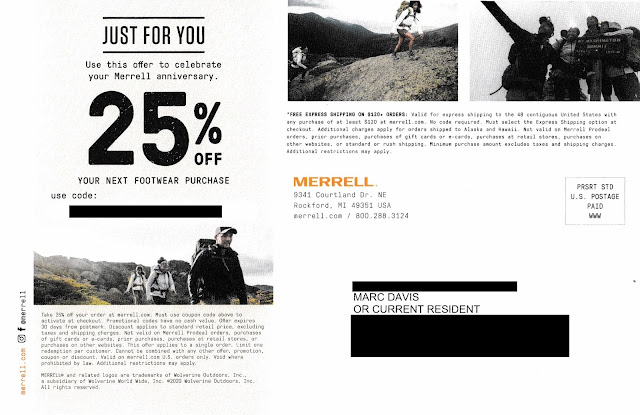Four years ago, I shared a recommendation that Merrell include a clearly communicated offer expiration date on their postcards.
In October, I received this postcard.
Their offer of $25 off a $100 purchase was good through 11/16/24; however, you need to point a magnifying glass at the very small disclosure* to discover that:
 |
| Disclosure with Expiration Date (Enlarged for readability) |
So, what happened? I thought about buying my wife a new pair of hiking shoes for Christmas. I set aside the postcard, and came back to it after Thanksgiving. I tried to make a purchase using the promo code on the postcard; however, alas, the offer had expired. This is Merrell's Fail for Content.
An expiration date motivates action. Action means response. Response means sales. The lack of an expiration means fewer sales for Merrell.
So why not put some urgency around the offer? Merrell could simply add, "Use your coupon code by November 16, 2024, to enjoy your discount" in a readable font size -- like you know, 12 or 14 point. Without increasing production costs, the message could appear in the white space below the picture of those cool Wrapt hybrid shoes or on the address panel above the name.
Lesson -- same as four years ago:
Your call to action should include a clearly communicated, definitive offer expiration date.
* Many people mistakenly refer to small print associated with marketing communications as a disclaimer, when in fact it is a disclosure. According to dictionary.com, a ‘disclaimer’ is “the act of disclaiming; the renouncing, repudiating, or denying of a claim; disavowal” while a ‘disclosure’ is “the act or an instance of disclosing; exposure; revelation.” ‘Disclose’ is defined as “to make known; reveal or uncover” From a Marketing standpoint, a disclaimer is an admission that the headline is false – otherwise why renounce it? However, a disclosure provides secondary but relevant facts of an offer. So the only reason an offer or marketing communication would require a disclaimer is if it was misleading from the onset.
.png)
.png)



